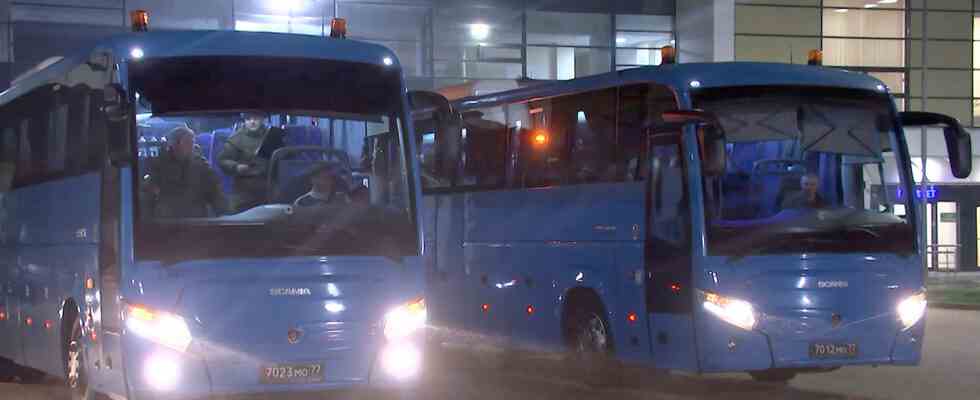Exclusive
Status: 09.02.2023 1:35 p.m
A German was apparently released in a prisoner exchange between Ukraine and Russia. He had fought on the Russian side and is now in Russia – apparently with the help of an AfD MP.
A German citizen who fought on the Russian side in the war against Ukraine and was captured is, according to information from NDR and WDR apparently released in the course of a prisoner exchange. Accordingly, Alexander F. is said to have left for Russia at his own request.
The 40-year-old has been said to have been in the so-called People’s Republics in eastern Ukraine, which are occupied by Russia, since 2014. At that time he had moved from Frankfurt am Main, where he had last lived. According to media reports, he was born in Ukraine and moved to Germany as a child. After leaving Germany, he joined the separatists supported by Russia, like “T-Online” first in November reported on the case in an article.
Alexander F. is one of only a few known cases of German citizens who were taken prisoner in this war. An association close to the AfD and a member of the Bundestag for the AfD are said to have campaigned for Alexander F’s release up to the highest political circles in Russia – bypassing official diplomatic channels of the federal government.
Presented on TV
As complex as the case of Alexander F. is, it is also difficult to understand the stages of his imprisonment. Russian state television apparently recently showed Alexander F. standing in front of a Russian military aircraft after an exchange of prisoners of war between Ukraine and Russia at the beginning of January – the placemark is “Moscow Oblast”.
The man who looks like Alexander F. greets his mother in Russian and says he has finally been exchanged. On his military uniform he wears the black and orange St. George’s ribbon, which is a symbol of support for Putin. Alexander F. was apparently part of a larger prisoner exchange in which 50 soldiers changed the front line. According to media reports, he was taken prisoner in Ukraine in the fall.
No official information about exchange
The Federal Foreign Office is aware of the Alexander F. case. The German embassy in Kyiv was in contact with the detainee. The ministry has so far had no information about a prisoner exchange, the Foreign Office said on request. Alexander F. or his mother were for NDR and WDR so far not achievable.
Through his sister, he said he only wanted to communicate with journalists “live” and on the spot – in Russian-occupied Donetsk. The Russian Embassy in Berlin and Russian authorities did not comment on the case when asked. The Ukrainian Embassy in Berlin also said on request that they had no information on Alexander F’s whereabouts.
AfD campaigned for the fighter
This seems to be different for representatives and supporters of the AfD. According to information from WDR and NDR the AfD member of the Bundestag Stefan Keuter and an AfD-related association apparently operated a questionable shadow diplomacy for months. According to this, Alexander F. is said to have received support from the Vadar eV association after his capture, which, together with the deputy, campaigned for an Fs prisoner exchange with the Russian authorities.
An exchange of letters that the AfD member of parliament Stefan Keuter and the chairman of the association Ulrich Oehme, formerly himself an AfD member of parliament, are said to have sent to the so-called Russian Commissioner for Human Rights, Tatjana Moskalkowa, is lying NDR and WDR before. According to a letter, Alexander F. “under no circumstances wants to go back to Germany because he is afraid of criminal prosecution in Germany”. He wants to live in Russia. Russia may advocate for an exchange of Alexander Fs.
Keuter, who confirms the process on request, and the head of the association also ask in the letter to hold a press conference together with the Russian human rights commissioner and to be allowed to “be there personally” if the exchange is successful. Moskalkova is said to have confirmed to the AfD people that Alexander F. had been brought back to Russia as part of an exchange. Now he is in Moscow.
The AfD deputy Keuter reaffirms his actions on request and rejects the term “shadow diplomacy”. He accuses the federal government of not using communication channels sufficiently. “I see it as the task of the opposition to hold talks and keep channels of conversation open,” said Keuter.
In the past, functionaries of the AfD and their political environment had repeatedly campaigned for pro-Russian positions. For example, they had pleaded for the lifting of sanctions – even after the start of the Russian war of aggression. Government officials have also repeatedly appeared on Russian state television.

